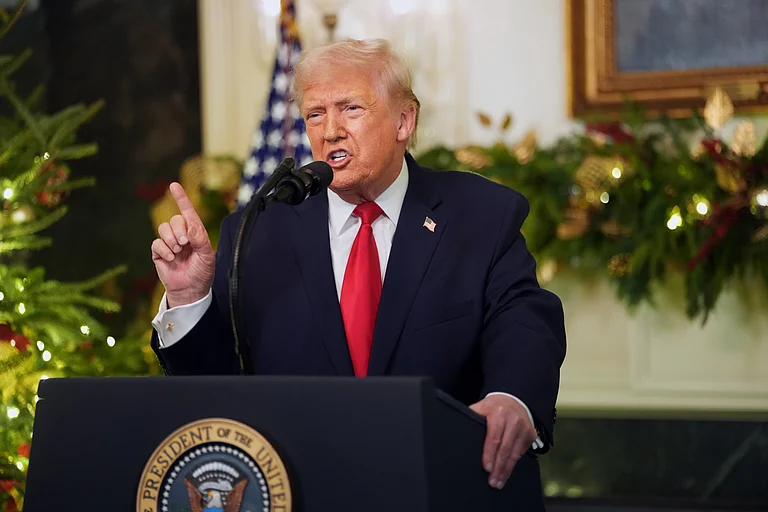Vice President Kamala Harris, the daughter of immigrants who rose through the California political and law enforcement ranks to become the first female vice president in U.S. history, formally secured the Democratic presidential nomination on Monday, making her the first woman of color to lead a major party ticket.
More than four years after her initial attempt at the presidency faltered, Harris' nomination caps a tumultuous and frenetic period for Democrats. This upheaval was sparked by President Joe Biden's disastrous June debate performance, which shattered his supporters' confidence in his reelection prospects and ignited fierce intraparty debates about whether he should continue his campaign.
As soon as Biden abruptly ended his candidacy, Harris and her team swiftly worked to secure the 1,976 party delegates needed to clinch the nomination. She achieved this milestone remarkably fast, with an Associated Press survey showing she locked down the necessary commitments just 32 hours after Biden's announcement.
Harris' nomination was confirmed following a five-day round of online voting by Democratic National Convention delegates, concluding Monday night. The party reported that 99 percent of delegates had cast their ballots for Harris. To ensure Biden would appear on the ballot in every state, the party had contemplated an early virtual roll call. It plans to formally certify the vote before holding a celebratory roll call at the party's convention later this month in Chicago.
An Associated Press-NORC Center for Public Affairs Research poll conducted after Biden's withdrawal found that 46 percent of Americans view Harris favorably, while a similar percentage holds an unfavorable view. However, more Democrats are satisfied with her candidacy compared to Biden's, energizing a party that had resigned itself to Biden as the nominee against former President Donald Trump, whom they see as an existential threat.
Harris has indicated she does not plan to deviate significantly from the themes and policies that framed Biden's candidacy, such as democracy, gun violence prevention, and abortion rights. However, her delivery can be more fiery, especially when she draws on her prosecutorial background to criticize Trump and his 34 felony convictions related to falsifying business records in a hush money scheme.
“Given that unique voice of a new generation, of a prosecutor and a woman when fundamental rights, especially reproductive rights, are on the line, it's almost as if the stars have aligned for her at this moment in history,” said Democratic Senator Alex Padilla of California, who was appointed to succeed Harris in the Senate when she became vice president.
A Splash In Washington Before A Collapse In The 2020 Primaries
Kamala Devi Harris was born on October 20, 1964, in Oakland, California, to Shyamala Gopalan, a breast cancer scientist who emigrated from India at 19, and Stanford University emeritus professor Donald Harris, a naturalized U.S. citizen originally from Jamaica. Her parents' advocacy for civil rights gave her what she described as a “stroller's-eye view” of the movement.
She spent years as a prosecutor in the Bay Area before being elevated to California's attorney general in 2010 and then elected as U.S. senator in 2016.
Harris arrived in Washington as a senator at the dawn of the volatile Trump era, quickly establishing herself as a reliable liberal opponent of the new president's policies and personnel. She gained national attention through her role on the Judiciary Committee, where she interrogated prominent Trump nominees, such as now-Supreme Court Justice Brett Kavanaugh.
“I'm not able to be rushed this fast,” then-Attorney General Jeff Sessions said during a 2017 hearing as Harris persistently questioned him about potential conversations with Russian nationals. “It makes me nervous.”
Harris launched her 2020 presidential campaign with high hopes, drawing parallels to former President Barack Obama and attracting over 20,000 people to her kickoff rally in her hometown. However, she withdrew from the primary race before the first nominating contest in Iowa, plagued by staff dissent and an inability to attract sufficient campaign funds.
Harris struggled to present a consistent pitch to Democratic voters and wavered on key issues like health care. She initially supported eliminating private insurance in favor of a full government-run system — “Medicare for All” — but later released a health care plan that preserved private insurance. Now, during her nascent general election campaign, Harris has already reversed some earlier, more liberal positions, such as her 2019 endorsement of a fracking ban.
While Harris tried to leverage her law enforcement background in her 2020 presidential campaign, it did not garner enough support in a party focused on police brutality issues.
Joining Biden's Team — And Evolving As Vice President
Despite past challenges, Harris was at the top of Biden's vice presidential shortlist, following his pledge in early 2020 to choose a Black woman as his running mate. He had a fondness for Harris, who had formed a close friendship with his late son Beau, Delaware's former attorney general.
Her initial months as vice president were turbulent. Biden tasked her with leading diplomatic efforts with Central America to address the root causes of migration, a move that drew Republican criticism and remains a political vulnerability. Harris also faced scrutiny for stumbling in major interviews, such as a 2021 sit-down with NBC News' Lester Holt, where she dismissively responded, “I haven't been to Europe,” when asked about her border visits.
For her first two years, Harris was often tied to Washington to break tie votes in the evenly divided Senate, which led to landmark victories on climate and health care but limited her ability to travel and connect with voters.
Her visibility increased after the 2022 Supreme Court ruling that dismantled Roe v. Wade, positioning her as the administration's chief spokesperson on abortion rights. As the first vice president to tour an abortion clinic, she speaks about reproductive rights in the broader context of maternal health, particularly for Black women.
Throughout her vice presidency, Harris has remained loyal to Biden while emphasizing her readiness to step in if needed. This transition became evident after Biden's debate performance against Trump in late June, where his stumbles eroded confidence among Democrats.
Headed To The Top Of The Ticket
After Biden ended his candidacy on July 21, he quickly endorsed Harris. In the first two weeks of her 2024 presidential bid, enthusiasm among the Democratic base surged, with donations, volunteers, and event attendance growing significantly.
The Harris campaign now sees renewed opportunities in states like Arizona, Nevada, North Carolina, and Georgia — areas Biden had begun to neglect in favor of solidifying the “blue wall” states of Michigan, Wisconsin, and Pennsylvania.
“The country is able to see the Kamala Harris that we all know," said Bakari Sellers, a national co-chair of her 2020 campaign. "We really didn't allow the country to see her” four years ago. Sellers added, “We had her in bubble wrap. What people are seeing now is that she's real, she's talented.”
Yet, Democrats anticipate that Harris' political honeymoon may wear off, and she will face increased scrutiny on Biden administration positions, the state of the economy, and volatile situations abroad, particularly in the Middle East. Harris has also yet to address extended questions from journalists or sit for a formal interview since beginning her campaign.
The Trump campaign has been eager to define Harris as she introduces herself to voters nationwide, releasing ads blaming her for high numbers of illegal crossings at the southern border during the Biden administration and labeling her “Failed. Weak. Dangerously liberal.”
Trump's supporters have also disparaged Harris as a diversity hire, while Trump himself has made racially charged remarks, incorrectly claiming that Harris only recently emphasized her Black identity while previously promoting her Indian heritage.
These remarks preview a campaign season likely to be filled with racist and sexist attacks against the person who would be the first woman and the first person of South Asian heritage to hold the presidency.
“I didn't know she was Black until a number of years ago when she happened to turn Black and now she wants to be known as Black," Trump said at the National Association of Black Journalists convention. "So, I don't know, is she Indian or is she Black?”
In response, Harris described these comments as “the same old show — the divisiveness and the disrespect” and said voters "deserve better.”
“The American people deserve a leader who tells the truth, a leader who does not respond with hostility and anger when confronted with the facts,” Harris said at a Sigma Gamma Rho sorority gathering in Houston. “We deserve a leader who understands that our differences do not divide us.”






_630_630.jpg?w=630&auto=format%2Ccompress&fit=max&format=webp&dpr=1.0)






















